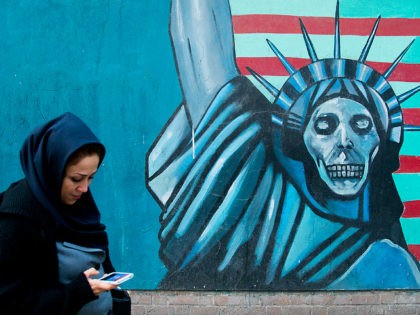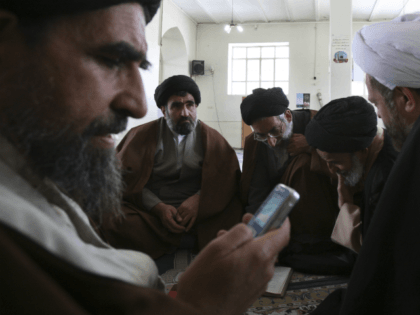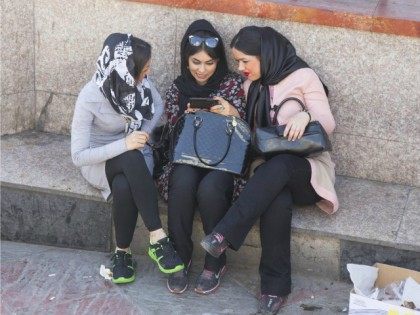NYT: Facebook Is Launching a Cryptocurrency
A recent article in the New York Times discusses Facebook and Telegram’s plans to introduce their own cryptocurrencies in the coming future.

A recent article in the New York Times discusses Facebook and Telegram’s plans to introduce their own cryptocurrencies in the coming future.

The Islamic State has released new threats against European countries in propaganda that shows the terrorist group may target mass transit systems in Germany.

TEHRAN – Iran’s telecoms minister said Tuesday it was “impossible to block citizen’s access to information”, a day after the conservative-dominated judiciary banned the hugely popular Telegram messaging app.

After a hearing on Friday that lasted only 18 minutes, a court in Moscow gave Russia’s Roskomnadzor agency the authority to ban the popular secure messaging platform Telegram. The company had refused to surrender its encryption keys to Russia’s FSB security service, as demanded by a 2016 counterterrorism law.

The chairman of the Iranian Parliament’s national security and foreign policy committee said this week that the popular messaging application Telegram, widely used by Iranians during the most recent uprisings which began on December 28, is “a security threat.”

Iran’s Islamic Revolutionary Guard Corps (IRGC) has reportedly engaged in a series of coordinated cyber warfare tactics to spy on, police, and arrest the Iranian people to secure its theocracy.

Popular encrypted messaging service Telegram was temporarily removed from Apple’s App Store for “inappropriate content” on Wednesday

Reports surfacing this week indicate that the Iranian regime has deployed online bots to push back against the people who want it dismantled and have relied on Internet access to organize protests.

Iranian members of parliament pressured President Hassan Rouhani to permanently block critical messaging and communications app Telegram, used by tens of millions living in the Islamic Republic, on Tuesday.

According to the Iranian judiciary, around 456 people remain in jail after the crackdown against the recent popular uprising, following the release of 440 “arrested rioters” over the past few days. The judiciary counted 25 deaths during the uprising, blaming them entirely on demonstrators while laughably claiming that government security forces fired no shots because they were “ordered not to use their weapons.”

In a piece titled, “Instagram Shuts Down Page of Iran’s Hero General Soleimani Again!” Iran’s state-run Fars News Agency protested the social media platform on Wednesday, which recently shut down IRGC-Quds Forces Gen. Qasem Soleimani’s page for a third time.

A video has surfaced on social media showing a former member of Iran’s Basij militia burning his ID card in solidarity with the people of Iran and against the Islamic Regime.

Anti-regime Iranians who are intent on seeing the dismantling of Iran’s Islamic regime have gone to war against pro-regime loyalists over social media.

Iran’s Supreme Leader Ayatollah Ali Khamenei published a piece on Sunday suggesting Iran’s late Reza Shah – the grandfather of Iran’s Crown Prince Reza Pahlavi – committed a grave “evil” by banning the compulsory hijab.

The State Department announced on Thursday that Iran’s Islamic regime has arrested at least 1,000 Iranians since protests began and announced that it will hold an emergency meeting to discuss the uprising and how to provide support for the people.

Iran’s elite Revolutionary Guards have reportedly deployed their forces to three provinces in an attempt to quash anti-government protests who are intent on dismantling the Islamic regime and replacing it with a free, democratically-elected government.

The Trump administration announced on Tuesday that it will use Facebook and Twitter to communicate directly with Iranians who are protesting against the Islamic regime in favor of democracy and freedom, hours after Iran’s repressive government shut off access to Instagram and Telegram in an attempt to stifle the uprising.

As protests over Iran’s faltering economy rapidly spread across the country, a channel on a mobile messaging app run by an exiled journalist helped fan the passions of some of those who took to the street.

Counterterrorism forces in France have broken up an Islamic terror cell, arresting nine people suspected of planning a jihadist attack on the city of Nice, thanks to intercepted messages among the group.

Multiple social media companies have reportedly been working with the Iranian government to censor content that does not meet the approval of the country’s strict religious authorities.

Iran’s judiciary has reportedly blocked Instagram Live and the voice calls feature from Telegram ahead of the country’s May 19 presidential elections.

Iran’s judiciary has blocked newly introduced voice calls on Telegram, the most popular messaging app in the country, state media reported on Wednesday.

Sky News reports on data from the International Center for the Study of Radicalization (ICSR) that shows a remarkable decline in the volume of online ISIS propaganda in concert with the recapture of territory from the Islamic State, particularly in Iraq.

The Wall Street Journal reports allegations by an Indonesian official that terrorism in the world’s largest Muslim-majority nation has been financed with Bitcoin and PayPay.

The Islamic State has published a list containing the names and addresses of thousands of churches in the United States, Canada, France, and the Netherlands, encouraging followers to attack them during the Christmas and New Year’s holiday season.

The Islamic State has published a picture of a Palestinian jihadi who blew himself up among Iraqi troops near the city of Mosul.

In a telegram to Mexican Bishop Trinidad Zapata of Papantla, Pope Francis has condemned the brutal murder of two Mexican priests, saying that they were victims of “inexcusable violence.”

The Islamic State is touting a sporty new update for its Amaq News smartphone app, promising a smoother, safer browsing experience.

A teenage girl, described as “very radicalised”, was arrested after being spotted by French anti-terrorism investigators making “disturbing” comments on the messenger service ‘Telegram’.

An Israeli cyber-intelligence company claims to have penetrated a private messaging forum used by Islamic State to plan and inspire attacks against “extremely specific” western targets, including American military bases in the Middle East.

TEL AVIV – The Islamic State plans to attack U.S. bases in Kuwait, Bahrain and Saudi Arabia, an Israeli cyberintelligence company that claimed to have hacked the terror group’s organization’s communications warned on Wednesday.

The SITE Intelligence group has confirmed that a jihadist cell calling itself “Ansar al-Khilafah Brasil” — “Soldiers of the Caliphate Brazil” — has pledged allegiance to Islamic State caliph Abu Bakr al-Baghdadi, stoking fears that ISIS jihadists are planning an attack on the upcoming Summer Olympics in Rio de Janeiro.

This Wednesday, India’s Supreme Court will hear a public interest litigation (PIL) petition seeking a ban on WhatsApp in the subcontinent on the grounds that the messaging platform’s end-to-end encryption could provide terrorists with access to one another through the app, which is impossible to intercept.

The Islamic State has launched a mobile phone app for children, in which they are taught the Arabic alphabet, Islamist ideology, and a useful vocabulary of words such as “tank,” “gun,” and “rocket.”

Hackers from the Islamic State-linked “United Cyber Caliphate” used the secure messaging platform Telegram to post a “hit list” of U.S. government employees on Monday, including sensitive personal information such as addresses, phone numbers, and email addresses.

The New York Times reports it was able to persuade Facebook to shut down six web pages used as “sprawling online arms bazaars” for terrorists and militants, “offering weapons ranging from handguns and grenades to heavy machine guns and guided missiles.”

In Iran, “moderates” and “reformists” are said to have fallen in love with the controversial encrypted chat app Telegram during an important parliamentary election.

Islamic State supporters have explored a variety of social media tools for distributing propaganda and coordinating their efforts, most recently the Telegram app — whose owners originally refused to take action against ISIS accounts because they wanted their platform totally free of government interference but changed their stance after the Paris massacre and began blocking ISIS-related channels.

At least one Islamic State (ISIS/ISIL) recruiter has taken to publishing photos of his cat with explosives to attract young people to the cause of jihad.

Much discussion of encrypted online communications after the Paris terror attack has transpired, though no evidence existed that the ISIS operatives, who killed 130 people, employed such techniques–until now.
